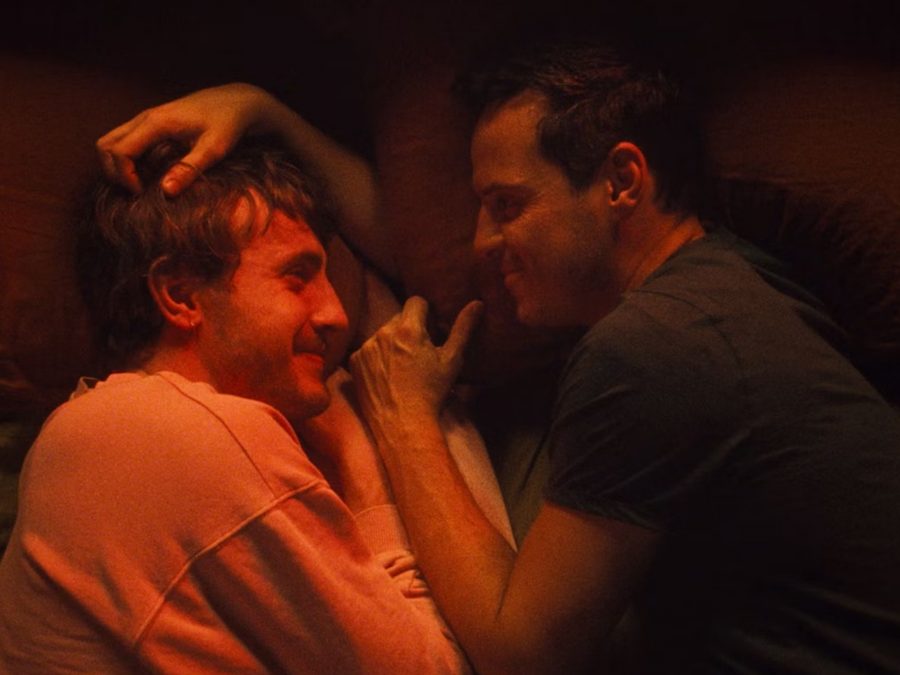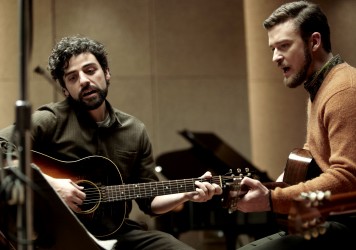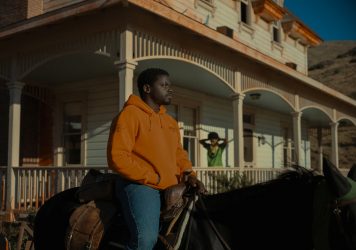
As the camera sweeps over a glittering party scene in Emerald Fennell’s sensation Saltburn – the one where Barry Keoghan sports antlers and Jacob Elordi wears angel wings – we hear the shrill hook of Mason and Princess Superstar’s “Perfect (Exceeder)”. “1-2-3-4, let me hear you scream if you want some more!” – the lyrics, paired with the heavy punch of the beat, gesture toward the film’s depictions of bacchanalian excess. Soon after the film’s release, the 2006 dance classic shot back into the UK and US charts, while on Spotify, the number of monthly listeners for Princess Superstar jumped almost overnight from 600,000 to nearly six million. On TikTok over 30,000 videos featuring some version of the song were created, contributing to such a surge in popularity; in the digital age, the precision strike of a perfect music cue holds more power than ever.
Kirsten Lane, Saltburn’s music supervisor, was already a seasoned professional across the landscape of British film and television, working on projects with such mainstays as Danny Boyle and Richard Curtis. Still, she saw her position soar to new heights of salience with the film’s viral needle drops, which also included more mainstream highlights of the mid-noughties like MGMT’s “Time to Pretend” and “Mr. Brightside” by The Killers. “The labels and the publishers are super excited when they’ve got their artists in a film,” Lane explains, as much of her role consists of liaising between the film’s production and the record labels who hold the rights to the music. “They’ll see it as their film. They get just as excited about the placement as the director. Everybody likes to feel that they’re a part of the process, and understanding that is really important.”
The music of Saltburn serves as its pulsating tonal throughline, irresistible as a club banger and just as electric, while still managing to fix the film’s highly specific sonic landscape. The capstone cue of the film, Sophie Ellis-Bextor’s “Murder on the Dancefloor” proved to be its most popular – over 20 years after the song’s initial release, Ellis-Bextor performed the song for the BAFTA’s 2024 ceremony, with a slew of gigs lined up across North America. “‘Murder on the Dance Floor’ for instance, was scripted, right at the very beginning,” Lane says. “Directors like Emerald, they’re very musical people. That’s part of their whole process. It’s certainly not my place to come in and rip it all out and say, oh, you can’t have that, you should do this. That’s not my job. My job is to make their dream come true.”
It’s a romantic notion, the idea that the role of a music supervisor is one of complete freedom, with the ability to choose individual songs and cues for a film’s soundtrack at a whim. The reality is more complicated, and collaborative. “Probably 90% of a music supervisor’s job is coordinating the clearances and licensing,” Lane admits. “Getting everybody on the same page and getting everybody to agree.” The construction of Saltburn’s soundtrack, for example, was largely based on Emerald Fennell’s own playlists from her time at Oxford University. When specific tracks were too expensive to license or the rights proved too difficult to clear, it was Lane’s job to suggest an alternative which captured the same tone necessitated by the script.
Despite such an emphasis on logistics, there is space for Lane to explore the creativity of the role. “If there are no music references in the script at all, it’s up to me to figure out: okay, this is a montage sequence, this is a key moment, this is a moment of comedy, a moment of drama, a moment of sadness,” she says. “I have to decide, does it need to be something that is well known? Or something that’s a hidden gem, that no one’s heard of before?”

Lane has been in the business since before the idea of the music supervisor existed; when she first entered the industry in the nineties, the job usually fell to a production assistant tasked with tracking down the rights to music. It was Lane and her boss at Polygram Records who together set up the first department dedicated to film and television within the record label, actively pitching the label’s catalogue to productions ranging from television to film to advertisements. Guy Ritchie’s Lock Stock and Two Smoking Barrels and Roger Michell’s Notting Hill served as breakthrough films for the budding position. Soundtrack coordinator, music consultant, music licensing coordinator – these credits served as the earliest versions of what is now understood to be the broader role of music supervisor. Lane has since worked with some of Britain’s most established filmmakers, including Edgar Wright, Joe Wright, Autumn de Wilde, and now Emerald Fennell.
Sitting at the opposite end of the tonal spectrum, Andrew Haigh’s All of Us Strangers featured several key moments where music served an important thematic role – so important that specific tracks were featured in the script, and therefore needed to be cleared by music supervisor Connie Farr before production began, and before any major names had been attached. “The Power of Love” by Frankie Goes to Hollywood provides emotional bookends for the film; upon the initial meeting between Andrew Scott’s Adam and Paul Mescal’s Harry, the song plays faintly in the background as part of a “Top of the Pops” episode. “There’s vampires at my door,” whispers a drunken Harry in the scene, paraphrasing the song, before turning away. Both instances of the song’s usage had to be cleared by the rights holders.
Connie Farr has spent most of her career working with independent filmmakers, including with Clio Barnard on Ali & Ava and Sarah Gavron on Rocks. Independent film means smaller budgets and less money to license major needle drops. Before putting together the soundtrack for Rocks, Farr interviewed the main actors and their parents, trying to find the right songs which might feel organic to the characters. “I had to try and predict, with the help of the rights holders, what might be big,” Farr explains. “I mean, we chose Little Simz, Ray BLK, Mae Muller, Kokoroko – and we were really trying to get these teenage girls to respond to the music, but they would say, ‘I don’t know it, never heard of it.’ That was the real challenge.”
The magic of Rocks was a certain intangible element of authenticity – the girls were not professional actors, and much of their rapport resulted from ad-libbed moments. During one scene, they reference a meme which samples a sermon by Shirley Caesar, a gospel singer based in North Carolina. As the film’s music supervisor, Farr had to find a way to contact Caesar directly in order to license the song; eventually, the production made a donation to her church. This is the kind of creative problem-solving which appeals to Farr.
“I think of it like a triangle. You’ve got to be flexible on either budget, creativity, or time. If you’ve got all the time in the world, I feel quite comfortable and confident, because there’s so many problems that can come up,” Farr says. “You’re helping someone facilitate their vision, but at the same time, I’m quite a big fan of independent labels and publishers and I really push for an independent alternative when I can. It’s so exciting when you get to pick some really obscure music.”
When working with these hidden gems, not every needle drop results in the same viral resurgence as “Perfect (Exceeder)” or “Murder on the Dancefloor.” After “The Power of Love” appeared in All of Us Strangers, the song didn’t climb back into the UK charts. Teenagers didn’t clip it into dance remixes on TikTok; Holly Johnson didn’t perform it at a high-profile awards show this year, 40 years after the song’s initial release. However, as the camera slowly pans out on Adam and Harry together, and the edges of the frame fade into an ether-black nothingness, it is the song which signifies one of the most powerful moments of the film: “Love is the light scaring darkness away.”
Published 1 May 2024

Clio Barnard’s refreshingly grounded, social realist riff on the classic romcom is one of her finest works to date.

By Jordan Cronk
With Hail, Caesar! hitting cinemas this week take a listen back through some of the directors’ greatest hits.

By Henry Boon
The Purple People Eater is the latest in a host of seemingly innocuous tunes that have their association forever changed through horror films.